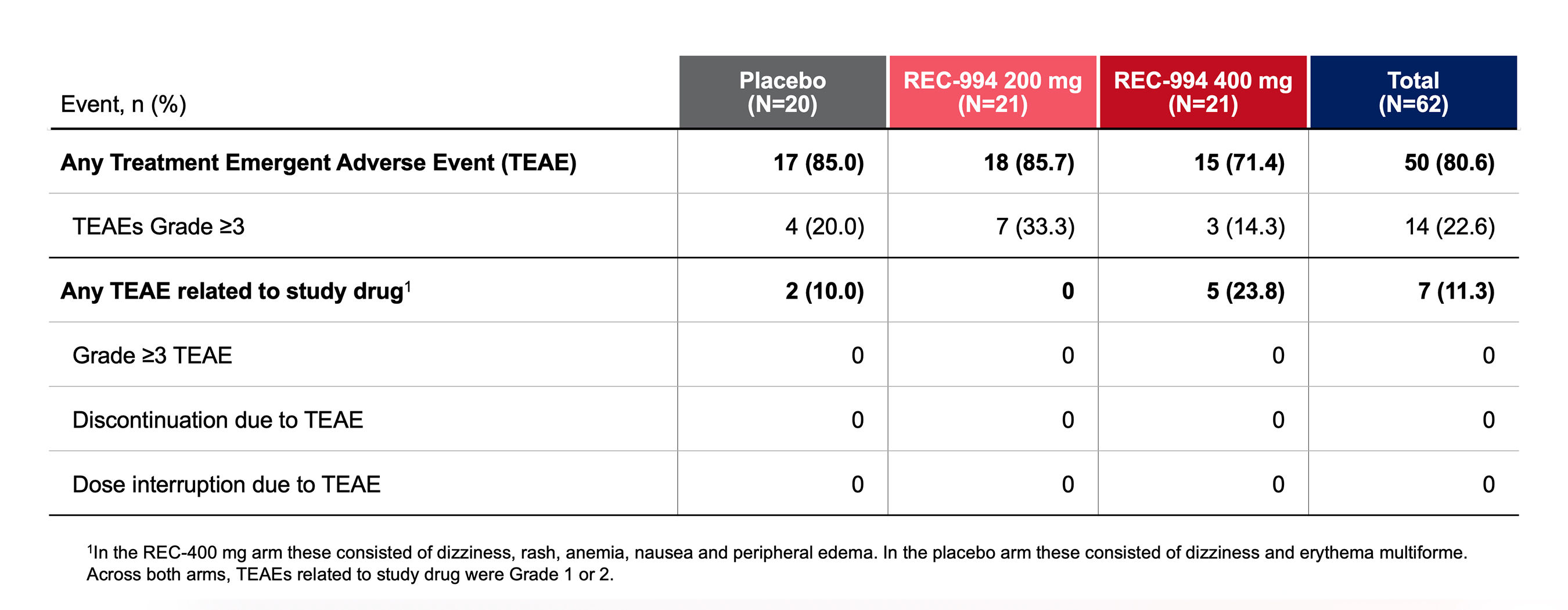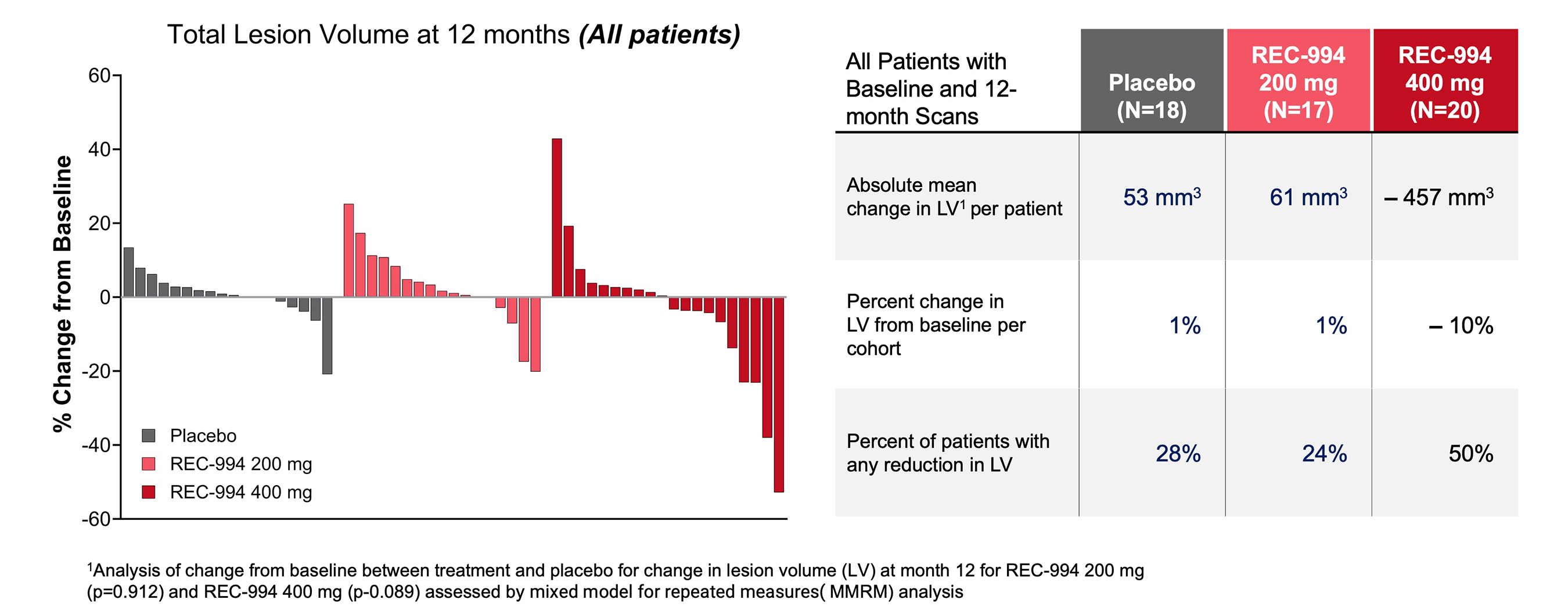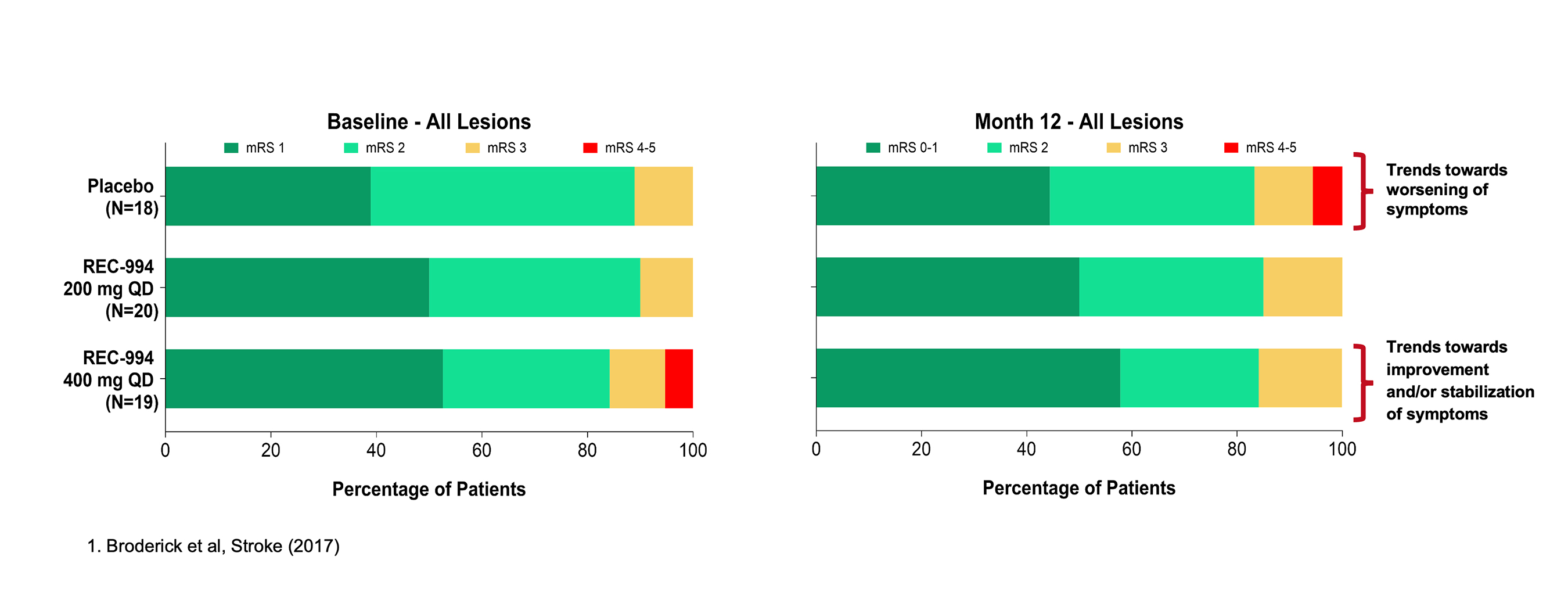Recursion Presents Phase 2 Data for REC-994 in CCM in Late-Breaking Oral Presentation at the International Stroke Conference
Recursion (RXRX) has reported positive 12-month data from its Phase 2 SYCAMORE trial of REC-994 for Cerebral Cavernous Malformations (CCM). The study met its primary endpoint of safety and tolerability, with no treatment-related discontinuations or Grade 3 adverse events.
Key findings for the 400mg dose include: 50% of patients showed reduction in total lesion volume versus 28% in placebo, with an absolute mean decrease of 457 mm³ compared to a 53 mm³ increase in placebo. Patients demonstrated trends toward improvement in modified Rankin scale (mRS) scores, particularly in those with brainstem lesions.
The most common adverse events included Covid-19, dizziness, headache, back pain, and constipation. The company plans to determine next steps through regulatory discussions and ongoing long-term extension study results.
Recursion (RXRX) ha riportato dati positivi a 12 mesi dal suo studio di Fase 2 SYCAMORE su REC-994 per le Malformazioni Cavernose Cerebrali (CCM). Lo studio ha raggiunto il suo obiettivo primario di sicurezza e tollerabilità, senza interruzioni del trattamento correlate o eventi avversi di Grado 3.
I risultati chiave per la dose da 400 mg includono: il 50% dei pazienti ha mostrato una riduzione del volume totale delle lesioni rispetto al 28% nel gruppo di placebo, con una diminuzione media assoluta di 457 mm³ rispetto a un aumento di 53 mm³ nel gruppo placebo. I pazienti hanno mostrato tendenze verso un miglioramento nei punteggi della scala di Rankin modificata (mRS), in particolare in quelli con lesioni del tronco cerebrale.
Gli eventi avversi più comuni includevano Covid-19, vertigini, mal di testa, mal di schiena e stitichezza. L'azienda prevede di determinare i prossimi passi attraverso discussioni regolatorie e risultati in corso di studi di estensione a lungo termine.
Recursion (RXRX) ha reportado datos positivos de 12 meses de su ensayo de Fase 2 SYCAMORE de REC-994 para Malformaciones Cavernosas Cerebrales (CCM). El estudio cumplió con su objetivo primario de seguridad y tolerabilidad, sin interrupciones del tratamiento relacionadas o eventos adversos de Grado 3.
Los hallazgos clave para la dosis de 400 mg incluyen: el 50% de los pacientes mostró una reducción en el volumen total de las lesiones frente al 28% en el placebo, con una disminución media absoluta de 457 mm³ en comparación con un aumento de 53 mm³ en el placebo. Los pacientes mostraron tendencias hacia la mejora en las puntuaciones de la escala de Rankin modificada (mRS), particularmente en aquellos con lesiones en el tronco encefálico.
Los eventos adversos más comunes incluyeron Covid-19, mareos, dolor de cabeza, dolor de espalda y estreñimiento. La empresa planea determinar los siguientes pasos a través de discusiones regulatorias y resultados de estudios de extensión a largo plazo en curso.
Recursion (RXRX)는 REC-994의 Phase 2 SYCAMORE 시험에서 뇌 혈관 기형(CCM)에 대한 12개월 긍정적인 데이터를 보고했습니다. 이 연구는 치료와 관련된 중단이나 3등급 부작용 없이 안전성과 내약성의 주요 목표를 충족했습니다.
400mg 용량의 주요 발견은 다음과 같습니다: 환자의 50%가 총 병변 부피 감소를 보였습니다, 반면 위약에서는 28%로, 위약에 비해 절대 평균 감소량은 457 mm³였으며 위약에서 53 mm³ 증가했습니다. 환자들은 특히 뇌간 병변이 있는 경우 수정된 Rankin 척도(mRS) 점수에서 개선 경향을 보였습니다.
가장 흔한 부작용으로는 Covid-19, 어지러움, 두통, 허리 통증 및 변비가 있었습니다. 이 회사는 규제 논의와 진행 중인 장기 확장 연구 결과를 통해 다음 단계를 결정할 계획입니다.
Recursion (RXRX) a rapporté des données positives sur 12 mois de son essai de phase 2 SYCAMORE concernant REC-994 pour les Malformations Cavernome Cérébrales (CCM). L'étude a atteint son objectif principal de sécurité et de tolérabilité, sans interruptions du traitement liées ou événements indésirables de Grade 3.
Les résultats clés pour la dose de 400 mg comprennent: 50 % des patients ont montré une réduction du volume total des lésions contre 28 % dans le groupe placebo, avec une diminution moyenne absolue de 457 mm³ par rapport à une augmentation de 53 mm³ dans le groupe placebo. Les patients ont montré des tendances vers l'amélioration des scores de l'échelle de Rankin modifiée (mRS), en particulier chez ceux présentant des lésions du tronc cérébral.
Les effets indésirables les plus courants comprenaient Covid-19, des vertiges, des maux de tête, des douleurs dorsales et de la constipation. L'entreprise prévoit de déterminer ses prochaines étapes à travers des discussions réglementaires et les résultats des études d'extension à long terme en cours.
Recursion (RXRX) hat positive 12-Monats-Daten aus seiner Phase-2-Studie SYCAMORE zu REC-994 für Zerebrale Kavernöse Malformationen (CCM) berichtet. Die Studie erreichte ihr primäres Ziel der Sicherheit und Verträglichkeit ohne behandlungsbedingte Abbrüche oder Grad-3-Nebenwirkungen.
Zu den wichtigsten Ergebnissen der 400-mg-Dosis gehören: 50% der Patienten zeigten eine Reduzierung des gesamten Läsionsvolumens im Vergleich zu 28% im Placebo, mit einem absoluten durchschnittlichen Rückgang von 457 mm³ im Vergleich zu einem Anstieg von 53 mm³ im Placebo. Die Patienten zeigten Tendenzen zur Verbesserung der modifizierten Rankin-Skala (mRS), insbesondere bei solchen mit Hirnstammläsionen.
Die häufigsten Nebenwirkungen umfassten Covid-19, Schwindel, Kopfschmerzen, Rückenschmerzen und Verstopfung. Das Unternehmen plant, die nächsten Schritte durch regulatorische Diskussionen und die Ergebnisse laufender Langzeitverlängerungsstudien zu bestimmen.
- Met primary endpoint of safety and tolerability with no serious treatment-related adverse events
- 50% of patients on 400mg dose showed lesion volume reduction vs 28% in placebo
- Absolute mean decrease in lesion volume of 457 mm³ in 400mg arm vs 53 mm³ increase in placebo
- Positive trends in functional outcomes for 400mg dose, particularly in high-risk brainstem patients
- Study was not powered to demonstrate statistical difference against placebo
- Most secondary endpoints (PROMIS29, CCM-HI, NIHSS, SMSS, CGI, PGI) showed no differences between treatment arms and placebo
Insights
The Phase 2 SYCAMORE trial results for REC-994 represent a significant milestone in CCM treatment, being the first industry-sponsored Phase 2 trial completed in this indication. The safety profile is particularly robust, with no treatment-related discontinuations or Grade 3 adverse events, establishing a solid foundation for future development.
The efficacy signals are compelling, especially in the 400mg dose group:
- 50% of patients showing lesion volume reduction (vs 28% placebo)
- Mean decrease in total lesion volume of 457mm³ (vs increases in other arms)
- Improved or stabilized mRS scores despite worse baseline function
The positive results in brainstem lesions are particularly noteworthy, as this represents a critical unmet need where surgical intervention isn't viable. The combination of lesion volume reduction and functional improvements in this high-risk population could position REC-994 as a groundbreaking therapeutic option.
However, it's important to note the study's limitations: it wasn't powered for statistical significance and patient stratification across dose levels was absent. The path forward will likely require careful regulatory navigation and a well-designed Phase 3 program, potentially with enriched patient populations and optimized endpoints based on these Phase 2 insights.
- Met primary endpoint of safety and tolerability in CCM patients with no treatment-related discontinuations or Grade 3 adverse events
- In comparison to placebo, treatment with REC-994 400 mg showed promising signals in both MRI-based lesion volume reduction and functional outcome as measured by changes in the modified Rankin scale (mRS) score
- In patients with cavernomas located in the brainstem, a subset of patients with significant unmet need, decreases in mean absolute total lesion volume and improvements in mRS scores with REC-994 400 mg were also observed
- Next steps will be guided by regulatory discussions and on-going long term extension study
SALT LAKE CITY, Feb. 05, 2025 (GLOBE NEWSWIRE) -- Recursion (Nasdaq: RXRX) reported 12 month data from the Phase 2 study (SYCAMORE) of REC-994, the first industry sponsored Phase 2 trial completed in Cerebral Cavernous Malformations (CCM). The Company announced in September 2024 that the signal-finding study met its primary endpoint.
These results were presented today at the Late-Breaking Science Concurrent Oral Abstract Sessions at the International Stroke Conference (ISC) in Los Angeles, CA. Recursion will also hold a webinar on Thursday, February 6th at 6:30am MT/8:30am ET/1:30pm GMT to present the Phase 2 data. The webinar will be broadcast from Recursion’s X (formerly Twitter), LinkedIn, and YouTube accounts with an opportunity to submit questions here. The full presentation can be accessed after the webinar on Recursion’s events & presentation page.
"The results of the SYCAMORE trial demonstrate safety of REC-994 for CCM patients and promising trends of efficacy including
“We are pleased to share the updated Phase 2 data through a late-breaking oral presentation at this year’s International Stroke Conference. These preliminary results show promising MRI-based and functional outcome signals, and we look forward to continued discussions with the FDA, and the CCM scientific and patient communities on next steps," said Najat Khan, Ph.D., Chief R&D Officer and Chief Commercial Officer of Recursion.
As the first industry-initiated trial in CCM, the SYCAMORE study was designed to evaluate safety as well as efficacy signals with broad patient populations. The trial was not powered to demonstrate statistical difference against placebo, and patients were not stratified or enriched across dose levels.
REC-994 SYCAMORE Phase 2 Trial Results
Safety & Tolerability (primary endpoint)
- No safety signals observed, with incidence of adverse events comparable between treatment and placebo arms
- Most common adverse events reported in at least
10% of participants included: Covid-19, dizziness, headache, back pain, and constipation- No SAEs related to study drug
- Majority of TEAEs were Grade 1-2
- No treatment-related adverse events that led to discontinuations

Select Secondary & Exploratory Analyses
- Total Cerebral Lesion Volume
- After 12 months of treatment,
50% of patients on REC-994 400 mg (N=20) demonstrated reduction in total lesion volume (LV) versus28% observed in placebo (N=18) . Patients on REC-994 200 mg (N=17) had similar changes in lesion volume compared to placebo - An absolute mean decrease in total lesion volume of −457 mm3 was observed in the 400 mg arm vs. an absolute mean increase of 61 mm3 and 53 mm3 in the 200 mg and placebo arms, respectively
- After 12 months of treatment,

- Modified Rankin Scale (mRS) scores
- The modified Rankin Scale (mRS) is widely recognized and approved by the FDA as a clinically meaningful endpoint for assessing functional outcomes in acute stroke trials. A single point change on the mRS is clinically relevant, with precedent for the FDA accepting dichotomous approaches using mRS cutoffs
- At baseline, patients on REC-994 400 mg had a greater proportion of mRS scores ≥ 3, including an mRS score of 4-5, indicating that at the start of study these patients had worse clinical function versus the placebo arm
- After 12 months of treatment, patients on REC-994 400 mg demonstrated trends toward improvement and/or stabilization of symptoms versus the placebo arm, which observed trends towards functional decline

- Brainstem Cohort
- Similar trends in lesion volume reduction and improvement or stabilization as assessed by mRS in the 400 mg REC-994 arm were seen in patients with brainstem lesions
- These observations support further investigation in a population of high unmet need, as cavernomas located in the brainstem are not amenable to surgical intervention
Additional secondary and exploratory analyses
- Time-dependent reductions in hemosiderin ring size observed in the 400 mg arm as compared to 200 mg and placebo
- Seizure frequency appeared to be reduced in the 400 mg arm as compared to 200 mg and placebo however, there was imbalance with respect to seizure history and frequency across the arms
- Incidence of new symptomatic hemorrhage events were comparable across arms and in line with natural history studies
- Other PROs including PROMIS29, CCM-HI, NIHSS, SMSS, CGI, and PGI did not demonstrate differences between the treatment arms of the study nor placebo
Next steps
Recursion intends to submit these data for publication in a peer reviewed scientific journal. Next steps will be guided by regulatory discussions and on-going long term extension study.
About REC-994
REC-994 is an orally bioavailable, superoxide scavenger small molecule under development for the treatment of symptomatic CCM. The potential of REC-994 in CCM was demonstrated using the earliest version of what would become the foundational technology underlying the Recursion OS. Subsequently, REC-994 demonstrated preclinical activity in models for CCM and tolerability and suitability for chronic dosing in Phase 1 single ascending dose escalation (SAD) and multiple ascending dose escalation (MAD) trials in healthy volunteers directed and executed by Recursion. Recursion received Orphan Drug Designation for REC-994 in symptomatic CCM in the US and Europe.
About the SYCAMORE Trial
Our Phase 2 SYCAMORE clinical trial is a randomized, double-blind, placebo-controlled study of two doses (200 mg and 400 mg) of REC-994 in participants with CCM. The primary endpoint of the study is safety and tolerability. Secondary efficacy endpoints include MRI-based endpoints, clinician and patient reported outcomes, as well as selected biomarkers. This trial was fully enrolled in June 2023 with 62 participants, and
About Recursion
Recursion (NASDAQ: RXRX) is a clinical stage TechBio company leading the space by decoding biology to radically improve lives. Enabling its mission is the Recursion OS, a platform built across diverse technologies that continuously generate one of the world’s largest proprietary biological and chemical datasets. Recursion leverages sophisticated machine-learning algorithms to distill from its dataset a collection of trillions of searchable relationships across biology and chemistry unconstrained by human bias. By commanding massive experimental scale — up to millions of wet lab experiments weekly — and massive computational scale — owning and operating one of the most powerful supercomputers in the world, Recursion is uniting technology, biology and chemistry to advance the future of medicine.
Recursion is headquartered in Salt Lake City, where it is a founding member of BioHive, the Utah life sciences industry collective. Recursion also has offices in Toronto, Montréal, New York, London, Oxford area, and the San Francisco Bay area. Learn more at www.Recursion.com, or connect on X (formerly Twitter) and LinkedIn.
Media Contact
Media@Recursion.com
Investor Contact
Investor@Recursion.com
Forward-Looking Statements
This document contains information that includes or is based upon “forward-looking statements” within the meaning of the Securities Litigation Reform Act of 1995, including, without limitation, those regarding the clinical relevance of the SYCAMORE trial data and obtaining additional confirmatory data; promising trends in REC-994 efficacy endpoints; Recursion’s plans to submit SYCAMORE trial data for publication in a peer-reviewed journal; advancing potential transformational therapies for CCM and beyond; subsequent REC-994 studies and their results and advancing Recursion’s REC-994 program further; the size of the potential CCM patient population; Recursion OS and other technologies; business and financial plans and performance; and all other statements that are not historical facts. Forward-looking statements may or may not include identifying words such as “plan,” “will,” “expect,” “anticipate,” “intend,” “believe,” “potential,” “continue,” and similar terms. These statements are subject to known or unknown risks and uncertainties that could cause actual results to differ materially from those expressed or implied in such statements, including but not limited to: challenges inherent in pharmaceutical research and development, including the timing and results of preclinical and clinical programs, where the risk of failure is high and failure can occur at any stage prior to or after regulatory approval due to lack of sufficient efficacy, safety considerations, or other factors; our ability to leverage and enhance our drug discovery platform; our ability to obtain financing for development activities and other corporate purposes; the success of our collaboration activities; our ability to obtain regulatory approval of, and ultimately commercialize, drug candidates; our ability to obtain, maintain, and enforce intellectual property protections; cyberattacks or other disruptions to our technology systems; our ability to attract, motivate, and retain key employees and manage our growth; inflation and other macroeconomic issues; and other risks and uncertainties such as those described under the heading “Risk Factors” in our filings with the U.S. Securities and Exchange Commission, including our Annual Report on Form 10-K and Quarterly Reports on Form 10-Q. All forward-looking statements are based on management’s current estimates, projections, and assumptions, and Recursion undertakes no obligation to correct or update any such statements, whether as a result of new information, future developments, or otherwise, except to the extent required by applicable law.
Photos accompanying this announcement are available at:
https://www.globenewswire.com/NewsRoom/AttachmentNg/d81f369a-3622-4ffc-b298-a2a3a31047a0
https://www.globenewswire.com/NewsRoom/AttachmentNg/b4285139-1d7e-42e3-95d8-a12bc8ea58a8
https://www.globenewswire.com/NewsRoom/AttachmentNg/8090c106-c7e6-416f-9060-c16ee5bb53ee








